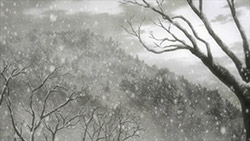 |
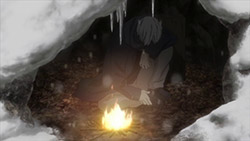 |
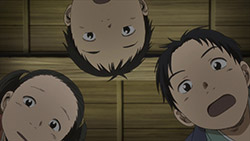 |
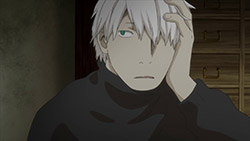 |
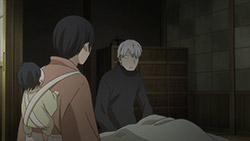 |
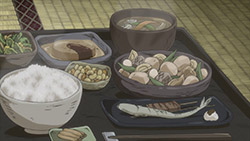 |
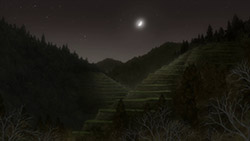 |
 |
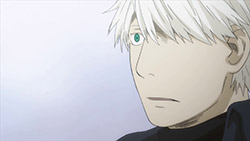 |
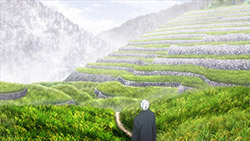 |
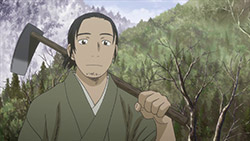 |
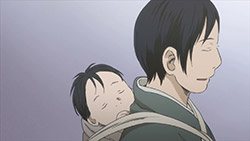 |
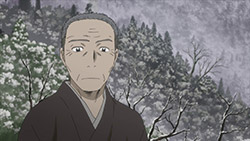 |
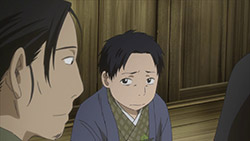 |
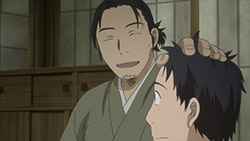 |
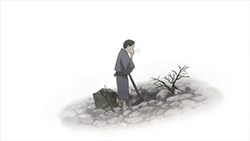 |
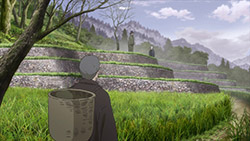 |
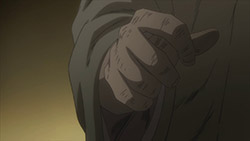 |
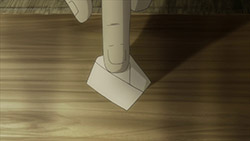 |
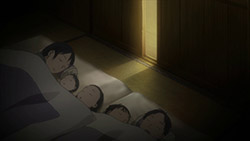 |
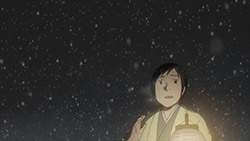 |
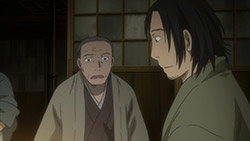 |
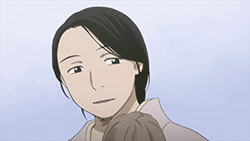 |
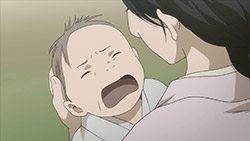 |
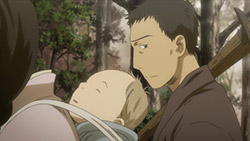 |
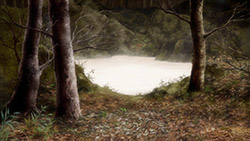 |
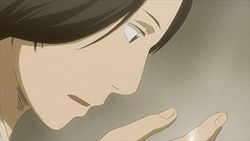 |
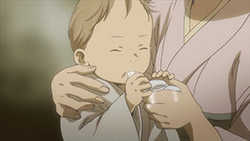 |
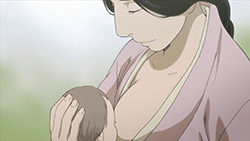 |
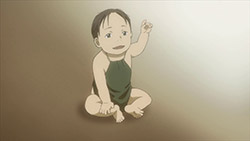 |
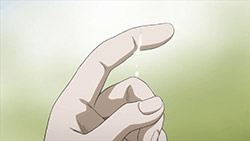 |
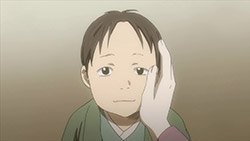 |
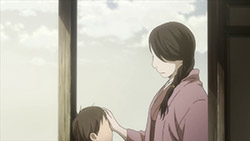 |
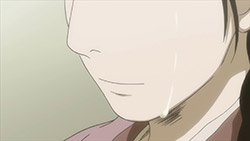 |
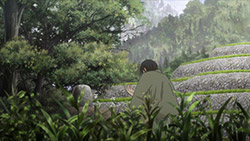 |
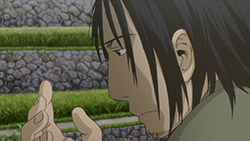 |
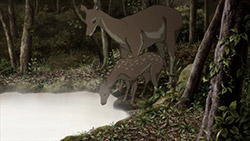 |
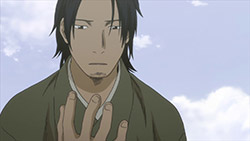 |
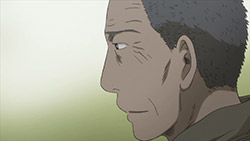 |
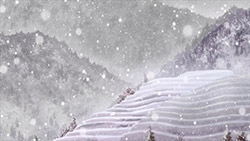 |
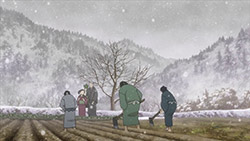 |
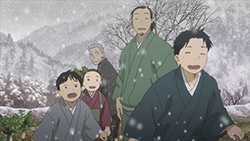 |
「潮わく谷」 (Shio Wakutani)
“Valley of Welling Tides”
I don’t know what I can add to an episode like that, really. That’s what anime perfection looks like.
I would strongly advise aspiring anime directors to avoid watching this week’s Mushishi. I think the instinctive reaction would be, “What’s the point after someone has already done that?” In an ideal world, on your very best day, you might just be able to duplicate it – but you’re certainly never going to do better. For an anime episode that captures everything that’s good and powerful about its subject, I think “Valley of the Welling Tides” was as close to perfect as it’s realistically possible to get.
The laundry list of superlatives for this episode is daunting. It was a sad and beautiful story, bittersweet in the way the best Mushishi tales usually are. It featured Ginko in arguably his most important role this season, and spun a truly memorable and meaningful tale about a compelling supporting cast. And while I don’t know what the real situation at Artland is, I do know that any studio that can produce an episode that looks as unrelentingly gorgeous as this one did can’t be beyond saving. Even the animation was superlative here, never mind the usual eye-candy backgrounds.
I’ve said it before, but there’s something about Mushishi and snow, some kind of mono no aware resonance effect that tends to make these episodes that much more beautiful and powerful. Falling snow and mountain snowscapes seem to bring out the best in Artland. This time around the setting is an isolated valley high in the mountains, and for the first time in a while Ginko is intrinsic to the plot right from the beginning. As the episode opens we see him holed up in a snow cave as a blizzard rages, seemingly unconscious. He’s discovered by a local man, Houichi (Matsushita Akira, another screen actor delivering a stellar Mushishi performance) who carries him back to his home.
This is a classic Mushishi premise – a rough but beautiful simple farm in a harsh but breathtaking setting, the voices of children played by real children, a seemingly straightforward and futsu situation that’s hiding something strange. Ginko first notices it in a glimpse of a lush green rice paddy through an open door, then in the unusual sweet smell he detects from Houichi when he finally meets him after regaining consciousness the next day. Houichi and his family are relentlessly kind to Ginko, who’s injured his leg – they feed him lavishly, the children are adorable, and Houichi is strong and possessed of seemingly boundless energy and work ethic. It could hardly be a more idyllic and admirable scenario, an ideal family building on oasis of plenty and kindness in the midst of winter.
One of the virtually endless array of things I loved here is that this episode perfectly captures Ginko’s dilemma. More often than not he isn’t asked to intervene in the lives of the people he meets – it’s a choice he must make, to be the one to deliver harsh and cruel news, and with a family as happy as this one that task is all the more thankless. It can’t be easy for him, and the reaction is nearly always “shoot the messenger”, which – while frustrating for us as an audience – is certainly understandable. Yet Ginko cannot un-know what he knows, and his conscience as a Mushishi and as a man won’t allow him to simply walk away.
In this instance Ginko has deduced that Houichi is operating under the influence of a parasitic Mushi called Chishio (“milk tide”) – one that converts the bodily fluids of the newborn host’s mother into milk, and once the host matures exudes a chemical that promotes the growth of plants. It then drives the host to work tirelessly to feed itself, and when the body collapses it leaves, finding another infant to start the entire process all over again. But the reaction of Houichi’s father (Kazumasa Takemoto – another film actor) is predictable – he’s angry and Ginko for recalling the tragedy of his wife’s death, and for interfering in the happy life his family has achieved in their little valley.
Truly, there’s so much pathos and so much that’s profound in this scenario. Houichi’s mother (Yoshie Tsuji) was glad that she’d been able (thanks to the Chishio, though she didn’t know the cost then) to produce milk and allow her son to survive till weaning, even if it meant giving her own life. Houichi works tirelessly for the goal of providing for his own family so that they’ll never want for anything, and believes he’s achieved what he has through his own hard work alone. There’s true nobility in what these people believe, even if it’s influenced by a Mushi – so in that sense, does it even matter why they feel what they feel? The feelings are real either way. The Narrator speaks of a “living tide” which imbues the Earth – “Milk turns to blood. Milk begets blood and returns to Earth.” Is what we’re seeing here so different, really, from the endless cycle of procreation which every species on Earth practices? Is the human experience not, more than anything, a story of parents giving of themselves to create their children and give them a chance at life?
Mushishi is not about simple answers or heroes and villains. It’s about beauty, and sadness, and contemplation – a meditation on questions that defy easy answers. As usual in its ending it leaves much up to us to decide, just as Ginko often does in his departures. He’s left a medicine with Houichi’s father that will purge the Chishio, and Houichi has told him that he cannot give up the power that allows him to provide for his family. But Ginko tells us that several years later, harsh winters have come to the valley – yet the valley still echoes with laughter and joy. Has Houichi decided that the sacrifice – of himself, or even more tellingly of his wife – is too great? Has his father slipped him the medicine without his knowing, his love of his son or the need to honor his wife’s sacrifice impelling him to do so? Each of us, just as in life, must decide on our own answer – but Mushishi has once again beguiled us with a gripping and moving fable that leaves us with much to think about.
Summer 2013 was the best season of the year – can 2014 duplicate that feat? Check out the LiA Summer Preview post – and vote in the season preview poll!
End Card
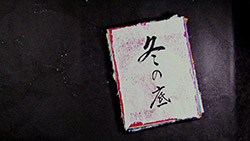 |

Best episode this season, together with Ping Pong Episode 10 and NogeNora Episode 6, in my opinion
For me, definitely the best anime episode of 2014 not from H x H – there are a few there they’d I’d say are on-par. For sure in my top 5 Mushishi eps ever, and in contention for the top 1.
If they are really that Isolated in this Valley. Then after some Generation’s it will turn quieter
Story telling that doesn’t give you the answer but lets your experience
and temperament decide what likely happened — that’s Mushishi Zoku Shou.
It’s tough to decide which course of action was taken since all were presented
with equal weight: did his father play a part accepting / continuing the
initial responsibility at the loss of his wife; or his son finally realizing
the tremendous cost involved to his wife and family?
I like to believe that it was a harmonious decision as no bitterness was portrayed
in the closing moments of the episode (as with some of the other episodes) and
the realization that family trumps all else — including the fertility of the land
you work. Based on what I hear of the Japanese work ethic (job before family),
I wonder if this wasn’t intentional on the writers.
Just a thought…
i jus fapped 2 https://randomc.net/image/Mushishi/Mushishi%20Zoku%20Shou%20-%2009%20-%20Large%2029.jpg
i tink i ned halp………. T_T
Oedipus complex?
You, sir, need professional help.
I thought it was good to see female breasts shown in a non-sexualized way in anime for once. You know, used for the purpose nature intended.
Finally, people who do listen to Ginko!
Oops for posting thrice, but I’ve always wondered how she could not noticed the change in composition of her bodily fluids immediately when she urinated, yawned, blew her nose, had her menstrual period, tasted her own saliva, or just about anything else. I also feel bad for the second child and daughter of the family, the one who has to sacrifice most… Look at her sleeping on the crack between the two beddings, the least favorable spot., and taking care of her younger siblings but not deemed as esteemed as the eldest and male child.
It seems Mushishi Zoku-Shou will be 10 episodes long and the ommited 2 will go to 3rd BD/DVD (released in November?). They also confirmed it is “first half” of the new Musishi but they didn’t give any information about when it will continue to air.
What? Dammit. I was hoping so much for the lightning episode…
Treasure every episode you get, because with Artland you never know if it’ll be the last. I’ll be hopeful we get the second cour as planned, but I’m not going to be counting on it.
Such a shame…
Do you know if they’re all going to end up on Crunchyroll or not?
No one knows yet, but I would bet against it.
So the ending was supposed to be left up to interpretation. I guess it was just a little unexpected which left me with a “huh” moment. It’s just that all the other episodes had a little more satisfying endings.
Wait. Wait. Wait. Is this supposed to be the last episode for the first cour of the second season??? Huh, what???
I realized something when watching this episode, and I’m surprised it didn’t blossom.
Ginko realizes Houichi’s origin when he sees his infant child. When telling Houichi about the mushi of the week, he states that the parasite works the host to its limits to gather food, until the host expires. Biologically, that’s very handy, because the parasite leaves when it’s at its peak. Ginko also stated that the parasite leaves when the host collapses of exhaustion, which was a catalyst in act 2. So Houichi is getting close to that point.
But that means that when he collapses, the chishio would need to seek out a new, infant host.
Like Houichi’s newborn child.
I suppose the denouement/resolving beat of the story implies that, 1, Houichi began deliberately resting to help his body last longer (symbolized by the snow on the fields), and 2, that the rest of his family began to help him to reduce the load. I guess it really could have gone both ways, if the writers felt like it.
There’s a moment of fridge horror, however, when you think about how miraculous the timing was. If Houichi expired, there would be no way to tend to the fields. The children are too young, the grandfather too old, and the mother of 4 young kids would not be able to work in the middle of winter– let alone with an entire valley of fields. They would be in a similar situation that Houichi’s parents were in. And although his father knew the truth of the events, I would bet that the mother would choose her family’s life over her own- just seems the best (yet horrid) option, barring an entirely new set of Ginko’s interference.
I suppose the magic of Mushishi is that it has no overall message behind repeating “Learn to live with mushi and deal with whatever consequences.” Since the focus of the story is more about the concept of mushi and the interesting situations it can create, there is no need to build compounding conflicts, like the style more popular in young adult/shonen stories. If it wants to be tragic, it can be tragic. If it wants to be uplifting, it can be that. And sometimes it can find a neutral spot.
I’ve noticed in my studies (I’m studying to be a comic editor) that the easiest way for a writer to draw in watchers is have some kind of dramatic, flowing action that makes you physically or emotionally react. But that works best for people who are young (and have free time and no stress). But older adults? They’re more worried about making rent by the end of the month, or finishing work for the day, to take on the anxiety of seeing another perilous story. That makes these more wistful, contemplate, almost philosophical episodes all the more special.
Still, the stories are solidly-constructed around conflict, and the art direction is so layered and clear, that the episodes are incredibly digestible. That each episode is stand-alone, and the concept of mushi is comprehended (but not fully understood) in a couple episodes makes this a great Pringles anime, too.
(Or if you’re like me, you buy a can of pringles, forget you bought them, then find them again and eat half the can in one sitting watching anime. You can do that, too)
TLDR; Mushishi awesome for everyone, hope someone responds/relates, and I really want pringles now. .w.
“Milk turns to blood. Milk begets blood and returns to Earth.” This sentence is even more beautiful in Japanese
Chichi wa chi to nari, chi wo tsukuri, chi e to kaeru
Props to the narrator, not only for her performance this episode but for the all the episodes in Mushishi so far.